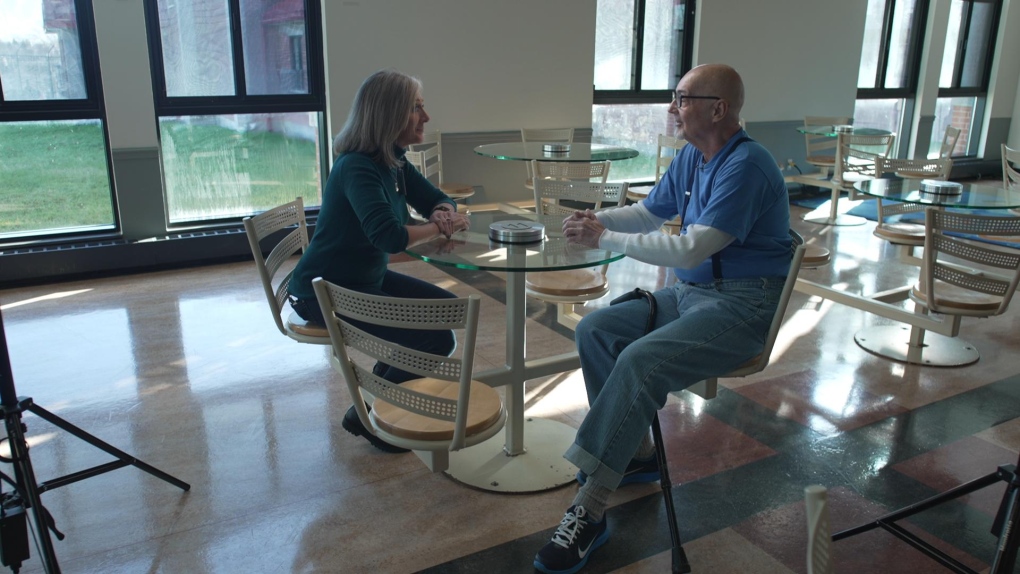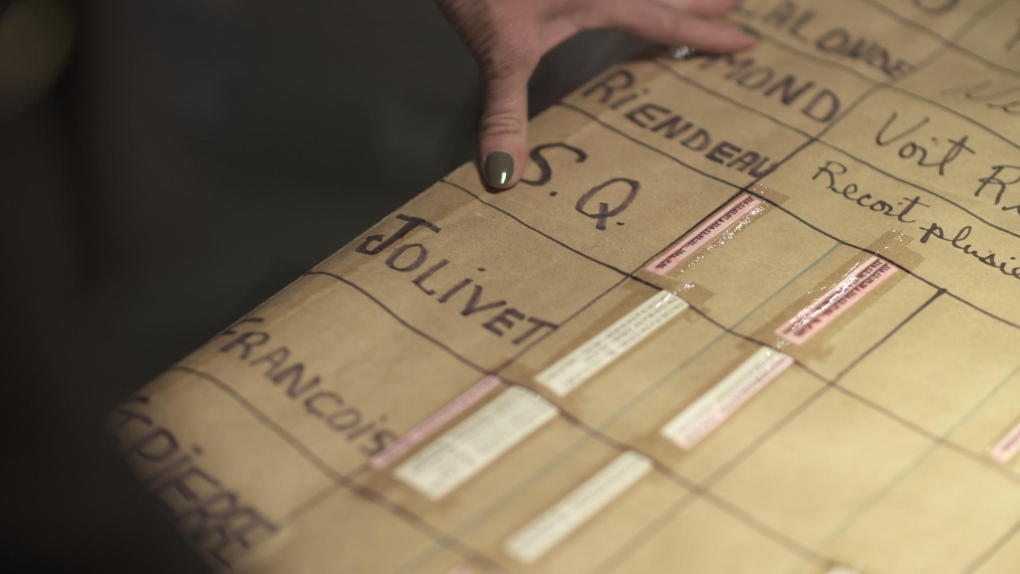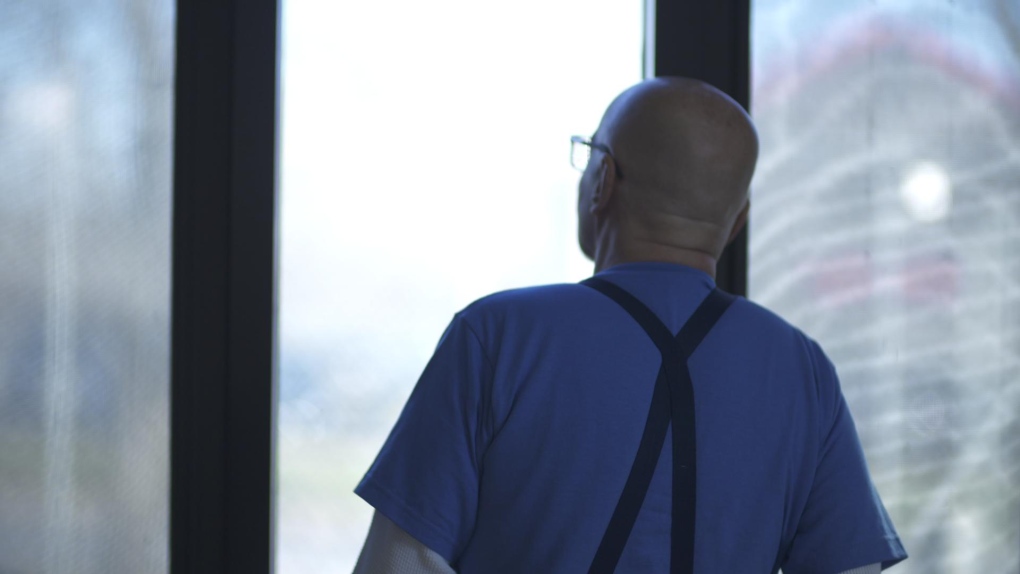Daniel Jolivet insists he's not a murderer and says he has proof
The gates of a Quebec prison slam shut behind us on a sunny day in December and after clearing security, I am sitting across from a convicted murderer.
Daniel Jolivet was found guilty of four murders more than three decades ago. He is a crook who tried to break out of Orsainville prison in 1993 by jumping off a roof. He is a thief with a long criminal record dating back to his first arrest when he was 14-years-old.
"I wasn't the kind of person that goes to church every day," he tells me.
We sit at a table in the visitors room, where we will talk for the next hour about his relentless efforts to prove he was wrongfully convicted. He has maintained his innocence since the day he was arrested and says he did not have a fair trial.
Jolivet politely shakes my hand, smiles and comments on the ray of light coming in through the window. Then he sighs deeply, clearly nervous. He offers our crew bottles of water he has brought from his cell as he greets them.
Jolivet was convicted of the murders in 1994. That's the year O.J. Simpson drove his white Bronco along Los Angeles freeways during history's most-watched low speed police chase. It is the year Schindler's List won an Oscar too.
He is now a man in his sixties wearing suspenders who walks with a cane. He has lost the flowing brown hair that was so prominent in the photos of his pre-conviction days. He also talks faster than anyone I have ever met, in both official languages -- at times beginning a thought in English and finishing it in French.
Where sentences should end, his words trip over one another. He's racing to be heard after all these years. The thread is hard to follow and untangle at times. But, as I soon come to understand, Jolivet is compressing details he has turned over and over in his mind for 30 years into just one hour.
His lawyer, Lida Nouraie, has reminded him in an earlier phone call to speak from the heart, not to go on and on with details and to take deep breaths. But over the course of our interview, I often have to interrupt him, and guide him away from the mountains of minutiae he has accumulated in his mind.
 CTV's Genevieve Beauchemin in an interview with Daniel Jolivet (W5)
CTV's Genevieve Beauchemin in an interview with Daniel Jolivet (W5)
The rest of his life, he says, is on the line. He dreams of a day he may walk out of prison, he tells me. But he knows life on the outside would be very different than the one he remembers. He tries to picture what the streets of Montreal look like now. He asks about the traffic.
The crime Jolivet says he did not commit, happened in Brossard, Que. Two men, Francois Leblanc and Denis Lemieux, were killed on Nov. 10, 1992. Two young women in their twenties, Catherine Morin and Nathalie Beauregard, were also murdered.
Jolivet knew the victims. He had done "business," as is said in the crime world, with them, committing robberies. He has maintained that he last saw them hours before they were found dead.
There is no physical evidence linking Jolivet to the killings, but there is a snitch. Claude Riendeau, a disgraced former police officer with an extensive criminal record. He told the court at trial that Jolivet confessed to the murders just hours after the shootings.
Jolivet did not testify at his own trial and years later, after he wrote more than 100 letters in a relentless pursuit of disclosure, he and his lawyer have uncovered more than 30 witness statements and other evidence that had not been originally released.
The details of the case are complex. There are several people involved and several locations to cover.
A few years ago, Jolivet used money he earned in prison to buy kraft paper, glue and markers to hand-draw a colour-coded chart on the floor in his cell. It illustrates who was where and when in the hours before, during and after the murders.
 Jolivet tells W5 his colour-coded, hand-drawn chart constitutes undeniable proof he is not the murderer.
Jolivet tells W5 his colour-coded, hand-drawn chart constitutes undeniable proof he is not the murderer.
It was based on cell phone data he received as a result of his freedom to information requests.
To him, it constitutes undeniable proof he is not the murderer. His lawyer now has it and she showed it to me days before we met in prison. She unfurled it and it covered an entire dining room table -- a document that must have taken months to produce behind bars.
Jolivet tells me a memorable detail -- about a gold Sombrero pendant. He says it is key to unravelling the case against him. He also has many other details to share.
But we have just a few minutes left in the visitors' room at the prison and Jolivet thanks me several times for listening.
"I want the whole of Canada to hear my story," he says.
He walks to the window and stares out past the barbed wires of the prison walls.
Then we hear the guard.
"Jolivet," he says.
Jolivet shakes my hand again.
And time is up.
We wrap up and leave and the heavy prison doors close behind us.
 "I want the whole of Canada to hear my story," Daniel Jolivet tells W5.
"I want the whole of Canada to hear my story," Daniel Jolivet tells W5.
CTVNews.ca Top Stories

Invasive and toxic hammerhead worms make themselves at home in Ontario
Ontario is now home to an invasive and toxic worm species that can grow up to three feet long and can be dangerous to small animals and pets.
Ontario to ban use of cellphones in school classrooms starting in September
Ontario is introducing a suite of measures that will crack down on cellphone use and vaping in schools.
Murder charge laid after man falls to death from Toronto apartment balcony
One person has been charged with second-degree murder in connection with the death of a man who fell from a balcony following an altercation inside a Toronto apartment building.
Ukraine's army chief reports tactical retreat in the east, and warns of front-line pressure
Ukraine's troops have been forced to make a tactical retreat from three villages in the embattled east, the country's army chief said Sunday, warning of a worsening battlefield situation as Ukrainian forces wait for much-needed arms from a huge U.S. aid package to reach combat zones.
Zendaya tennis movie ‘Challengers’ scores at weekend box office
Zendaya and castmates Mike Faist and Josh O’Connor have been on a globetrotting press tour to get the word out about Italian director Luca Guadagnino's original film, which opened in 3,477 locations in the U.S. and Canada.
Dozens in Italy give a fascist salute on the anniversary of Mussolini's execution
Dozens of people raised their arms in the fascist salute and shouted a fascist chant during ceremonies Sunday to honor Italian dictator Benito Mussolini on the 79th anniversary of his execution.
Have you heard the one about Trump? Biden tries humour on the campaign trail
U.S. President Joe Biden is out to win votes by scoring some laughs at the expense of Donald Trump, unleashing mockery with the goal of getting under the former president's thin skin and reminding the country of his blunders.
'Do not consume': Gift Chocolate recalled due to undeclared milk, soy
The Canadian Food Inspection Agency has issued a recall for a specific chocolate brand sold in Ontario and Quebec.
Laurentian University to spend millions on recommendations in second budget post insolvency, but nothing new to reopen pool
Laurentian University's board of governors approved a budget of just over $201.7 million for the 2024-2025 fiscal year.
Local Spotlight

DonAir force takes over at Oilers playoff games
As if a 4-0 Edmonton Oilers lead in Game 1 of their playoff series with the Los Angeles Kings wasn't good enough, what was announced at Rogers Place during the next TV timeout nearly blew the roof off the downtown arena.
'It was instant karma': Viral video captures failed theft attempt in Nanaimo, B.C.
Mounties in Nanaimo, B.C., say two late-night revellers are lucky their allegedly drunken antics weren't reported to police after security cameras captured the men trying to steal a heavy sign from a downtown business.
Fergus, Ont. man feels nickel-and-dimed for $0.05 property tax bill
A property tax bill is perplexing a small townhouse community in Fergus, Ont.
Twins from Toronto were Canada's top two female finishers at this year's Boston Marathon
When identical twin sisters Kim and Michelle Krezonoski were invited to compete against some of the world’s most elite female runners at last week’s Boston Marathon, they were in disbelief.
Mystery surrounds giant custom Canucks jerseys worn by Lions Gate Bridge statues
The giant stone statues guarding the Lions Gate Bridge have been dressed in custom Vancouver Canucks jerseys as the NHL playoffs get underway.
'I'm committed': Oilers fan skips haircuts for 10 years waiting for Stanley Cup win
A local Oilers fan is hoping to see his team cut through the postseason, so he can cut his hair.
'It's not my father's body!' Wrong man sent home after death on family vacation in Cuba
A family from Laval, Que. is looking for answers... and their father's body. He died on vacation in Cuba and authorities sent someone else's body back to Canada.
'Once is too many times': Education assistants facing rising violence in classrooms
A former educational assistant is calling attention to the rising violence in Alberta's classrooms.
What is capital gains tax? How is it going to affect the economy and the younger generations?
The federal government says its plan to increase taxes on capital gains is aimed at wealthy Canadians to achieve “tax fairness.”













































